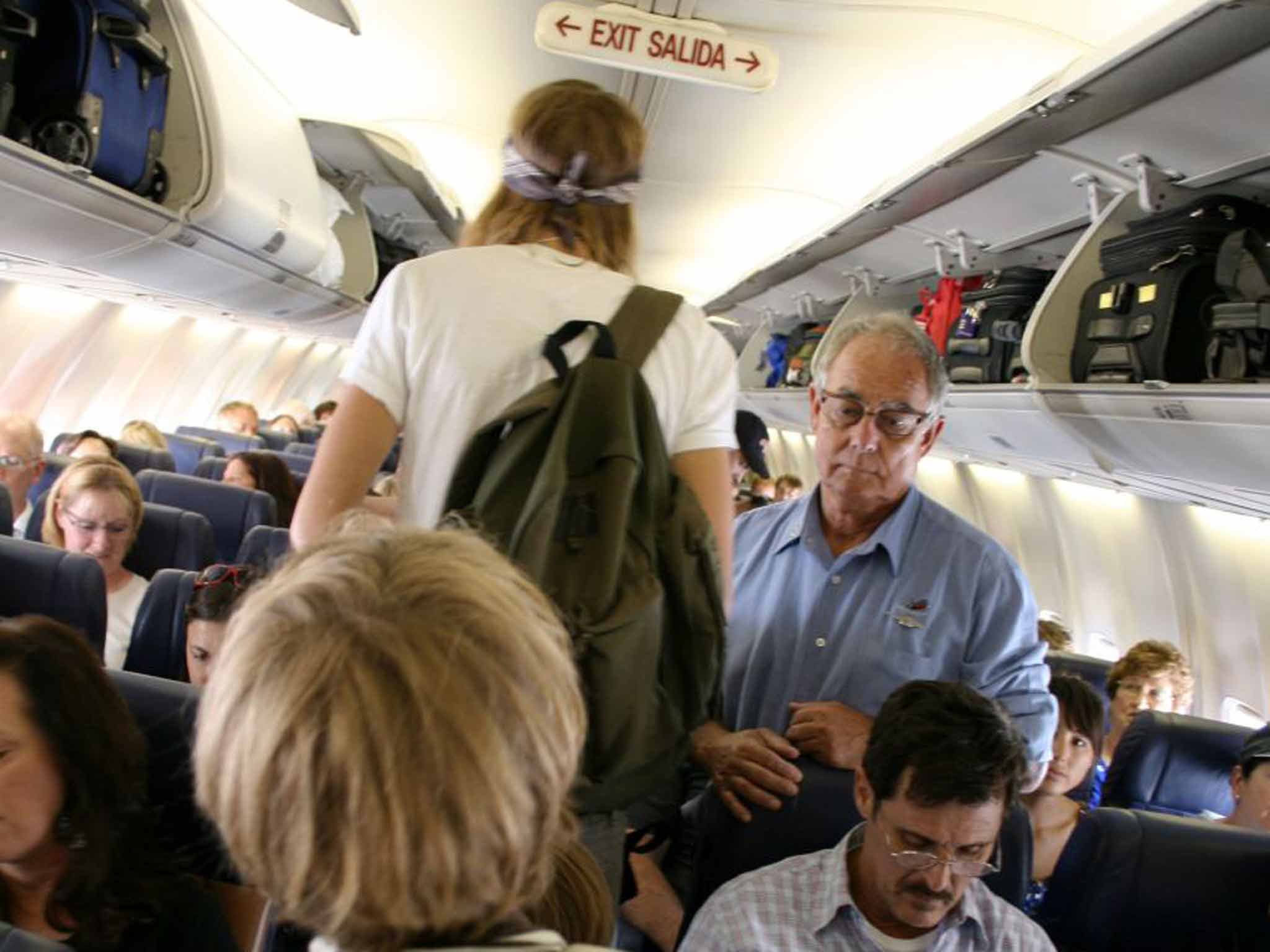Should there be minimum dimensions for passenger seats and legroom on planes?
The man who pays his way

Your support helps us to tell the story
From reproductive rights to climate change to Big Tech, The Independent is on the ground when the story is developing. Whether it's investigating the financials of Elon Musk's pro-Trump PAC or producing our latest documentary, 'The A Word', which shines a light on the American women fighting for reproductive rights, we know how important it is to parse out the facts from the messaging.
At such a critical moment in US history, we need reporters on the ground. Your donation allows us to keep sending journalists to speak to both sides of the story.
The Independent is trusted by Americans across the entire political spectrum. And unlike many other quality news outlets, we choose not to lock Americans out of our reporting and analysis with paywalls. We believe quality journalism should be available to everyone, paid for by those who can afford it.
Your support makes all the difference.British Caledonian was big at Gatwick in the 1970s and 1980s. As the UK's second-biggest intercontinental airline, “BCal” had a fine fleet of Boeings. And it also had a fleet of Transit mini-buses, with which to ship its staff around the airfield. When one of these Fords reached the end of its useful life, the airline pensioned it off to a local school – still bearing the original logo.
Evidently, British Caledonian bosses hadn't thought through the potential brand damage caused by uncouth students as they were ferried around on school trips to places rather more interesting than Crawley. It may have been correlation rather than causation, but the airline was soon taken over by British Airways and the BCal brand disappeared.
Nottingham High School went one better: the local brewery offered them a brand new lorry and invited them to take it away for a pan-European excursion.
Shipstone's of Nottingham acquired a new truck each year, but before the vehicle began the quotidien business of bearing barrels and bottles around the East Midlands, it needed to be properly run-in.
“So, they loaned it to my school for a summer camping holiday,” reports Stephen Davies, a participant in the 1965 adventure. “At the end of the trip they received a fully run-in vehicle.”
While sitting with a couple of dozen other chaps in the back of a lorry as it trundled across Europe was far from comfortable, it was cheap. At the time, £25 would buy a one-way flight to Prague. But for Mr Davies and his classmates, it instead bought three weeks of adventure to and through the Iron Curtain.
At the Czechoslovak frontier with Germany, they hit problems with officialdom – but from the country they were leaving, not approaching. “We came up against Bavarian bureaucracy and got fined at the border for driving a heavy vehicle on a Sunday,” says Mr Davis. “We were lucky – they could have impounded the lorry.”
Brand values
As they drove through Bohemia – possibly the best lager territory in the world – the boys found the Shipstone's marque was far from a liquid asset. “When we arrived at the Prague campsite we were greeted by a Brit in a knotted handkerchief who bemoaned having to drink Shipstone's during the war. We got cursed by plenty of other Brits who had bad experience of the brewery's product.”
As with the Transit van in Crawley, so with the brewery truck from Nottingham: the generous provider of transport was destined for a one-way journey to oblivion; soon after the “Velvet Revolution” in Prague, Shipstone's stopped making beer.
Ease the squeeze?
In 2016, £25 will still buy you a one-way flight to Prague. But unlike Mr Davies and his pals in the back of the beer lorry, you will get a proper seat on an easyJet, Ryanair or Wizz Air plane. And if a US congressman's campaign takes hold worldwide, you can look forward to more space, but higher fares.
Steve Cohen, a medium-sized Representative from Tennessee, has introduced the “Safe Egress in Air Travel Act” (SEAT Act for short), demanding minimum dimensions for passenger seats and legroom. “Consumers are tired of being squeezed both physically and fiscally by airlines,” he explains. Mr Cohen's main concern is about the ability of passengers to evacuate the aircraft in an emergency, but he also warns of the growing danger of deep-vein thrombosis (DVT) as well as general discomfort.
Passenger dissatisfaction with personal space is not simply down to airlines packing in more seats; it is also a result of higher loads. When budget airlines began flying in Europe 20 years ago, an average of three out of 10 seats were empty; today, only one in 10 is unoccupied. As a result, there is a much slimmer chance of an empty seat adjacent.
What is baffling about Mr Cohen's bill is that a maximum passenger load is already stipulated for each aircraft type, based on how quickly passengers can get out. Plane-makers must show they can evacuate a full aircraft within 90 seconds, even with half the emergency exits disabled.
No airline, though, has operated the Airbus A380 “superjumbo” at anything like its certificated capacity of 853 passengers. To do so would involve a one-class-only configuration, with 11 seats abreast in a 3-5-3 arrangement. I'd take the back of a lorry over the middle seat, thanks.
Join our commenting forum
Join thought-provoking conversations, follow other Independent readers and see their replies
Comments